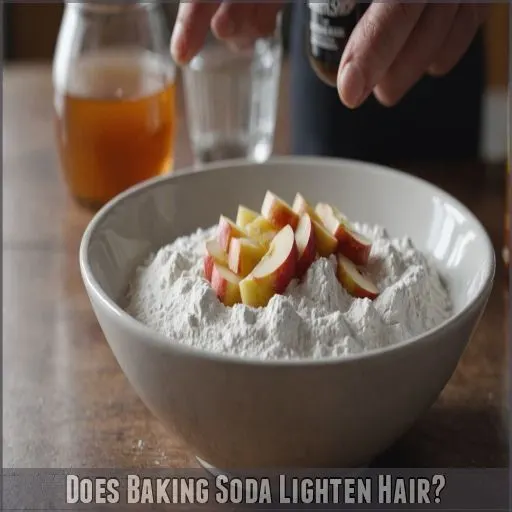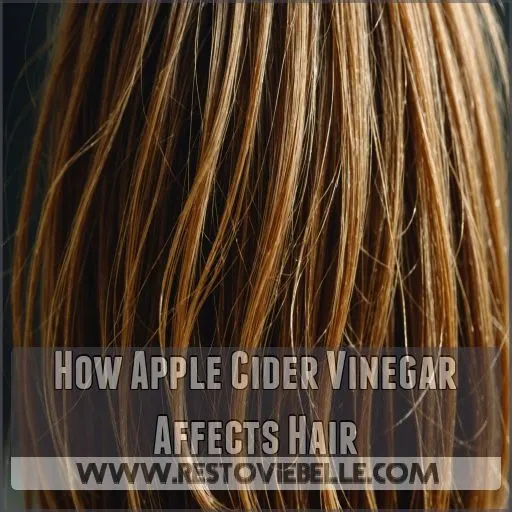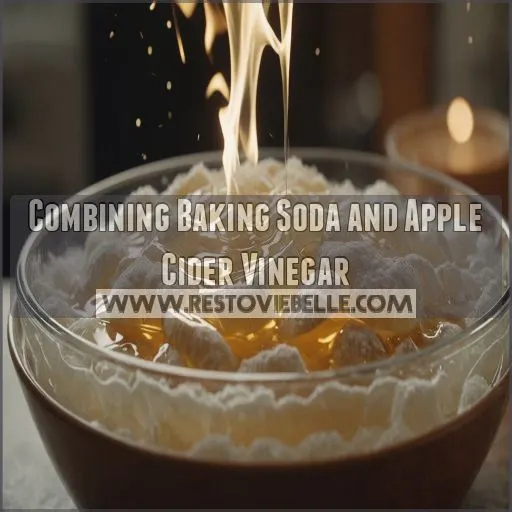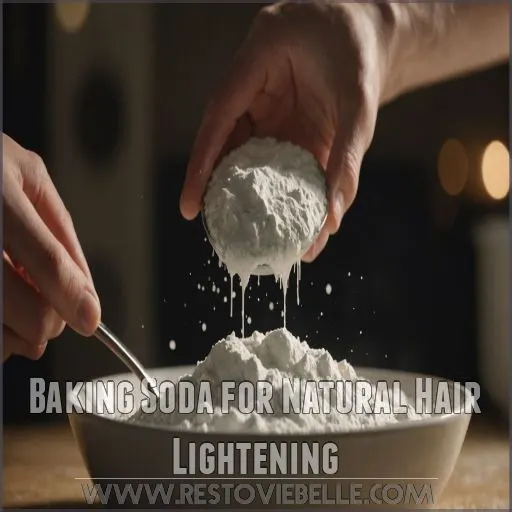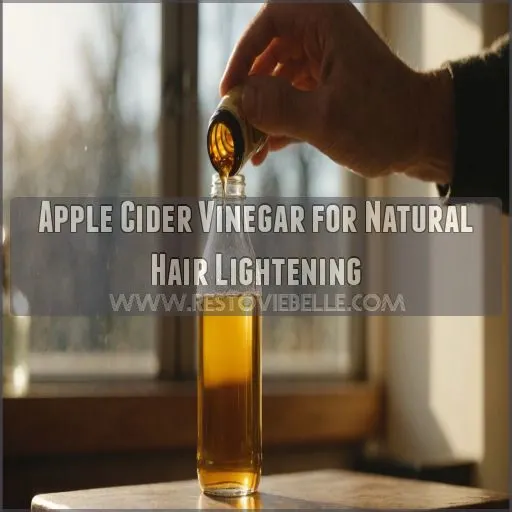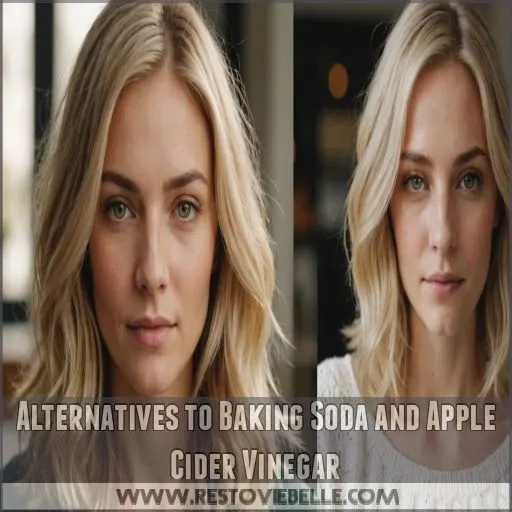This site is supported by our readers. We may earn a commission, at no cost to you, if you purchase through links.
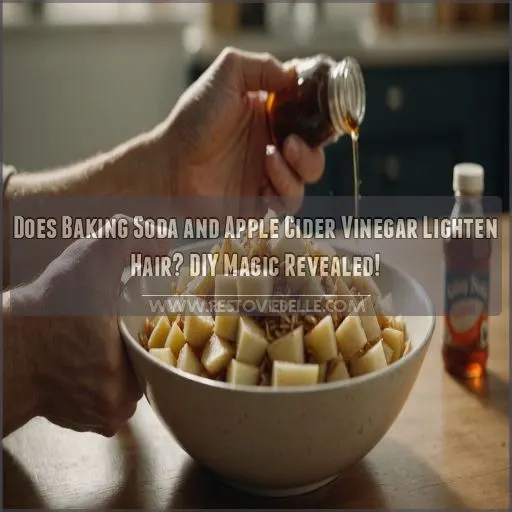
This DIY duo works gradually, giving you subtle results over time.
Baking soda acts like a gentle eraser for hair color, while apple cider vinegar adds shine and removes product buildup.
Together, they’re like a low-key salon treatment in your kitchen.
But proceed with caution – overuse can leave your locks feeling drier than the Sahara.
If you’re looking for a natural way to brighten your ‘do without breaking the bank, this dynamic duo might be your new best friend.
Just remember, patience is key when it comes to this hair-lightening hack.
Table Of Contents
- Key Takeaways
- Does Baking Soda Lighten Hair?
- How Apple Cider Vinegar Affects Hair
- Combining Baking Soda and Apple Cider Vinegar
- Baking Soda for Natural Hair Lightening
- Apple Cider Vinegar for Natural Hair Lightening
- Alternatives to Baking Soda and Apple Cider Vinegar
- Frequently Asked Questions (FAQs)
- How to use lemon and apple cider vinegar for hair lightening?
- Can you use apple cider vinegar to lighten gray hair?
- How can I lighten my hair naturally?
- Can baking soda lighten hair?
- What does baking soda and apple cider vinegar do to your hair?
- Will vinegar and baking soda lighten hair?
- How long does it take for baking soda to lighten hair?
- Can apple cider vinegar make your hair lighter?
- How often should I use this treatment?
- Will it strip color-treated hair?
- Can I add essential oils for fragrance?
- Does hair type affect the lightening results?
- Are there any long-term effects on scalp health?
- Conclusion
Key Takeaways
- You can lighten your locks naturally with this kitchen duo, but don’t expect overnight miracles. It’s more of a gradual glow-up than a dramatic dye job.
- baking soda acts like a gentle eraser for hair color, while apple cider vinegar adds shine and kicks product buildup to the curb. Together, they’re your hair’s new dynamic duo.
- Proceed with caution — overusing this DIY treatment can leave your tresses drier than a desert. Moderation is key, so aim for 2-3 applications per week max.
- While it works on both dyed and natural hair, results may vary. If you’re after a more dramatic change, you might want to consider professional options or other natural alternatives like lemon juice or chamomile tea.
Does Baking Soda Lighten Hair?
Looking to lighten your locks without harsh chemicals?
You’ve probably heard whispers about baking soda’s hair-lightening potential, and we’re here to spill the tea (or should we say, sprinkle the powder?) on this kitchen staple’s ability to brighten your tresses.
Baking Soda’s Lightening Effect on Dyed Hair
Baking soda can work wonders on your dyed locks!
This kitchen staple acts as a natural cleansing agent, gradually stripping away semipermanent hair color.
- It’s most effective on recently dyed hair
- Multiple washes may be needed for desired results
- It can lighten all hair colors
- Overuse may lead to dryness
Remember, baking soda is abrasive, so use it sparingly to avoid damage.
Think of it as a gentle eraser for your hair’s canvas!
Baking Soda’s Effectiveness on Undyed Hair
For those with undyed hair, baking soda can indeed work its magic as a natural lightener.
You’ll notice a subtle color change after a few applications, but don’t expect drastic results overnight.
While it’s gentler than chemical treatments, repeated use may lead to some hair damage.
So, if you’re looking to brighten your locks without harsh chemicals, baking soda might be your new best friend – just remember to use it sparingly!
Using Baking Soda With Hydrogen Peroxide for Enhanced Lightening
While baking soda alone won’t do much for undyed hair, pairing it with hydrogen peroxide can work wonders.
This dynamic duo packs a powerful punch, lightening your locks by one to two shades .
But don’t go overboard! Mix 2 teaspoons of baking soda with 1 1/2 teaspoons of hydrogen peroxide to create a paste (Source).
Remember, with great lightening power comes great responsibility – use this method sparingly to avoid drying out your tresses.
How Apple Cider Vinegar Affects Hair
You’ve heard about baking soda, but what about its tangy cousin, apple cider vinegar?
This kitchen staple isn’t just for salad dressings—it can work wonders on your hair too, from subtle lightening to removing stubborn product buildup.
Apple Cider Vinegar’s Mild Bleaching Effect
Now, let’s talk about apple cider vinegar’s subtle magic on your locks.
You might be surprised to learn that ACV can gently lighten your hair, especially if you’re rocking warmer tones .
It’s like giving your strands a natural sun-kissed glow without the harsh chemicals.
But here’s the kicker: ACV’s effects are gradual, so don’t expect overnight miracles.
Think of it as a slow dance to lighter, brighter hair.
Removing Product Buildup With Apple Cider Vinegar
Apple cider vinegar isn’t just for lightening your locks – it’s a hair care superhero!
You know that gunky feeling when products build up? ACV swoops in to save the day. It’s like a reset button for your hair, washing away residue and leaving you with a clean slate .
Your scalp will thank you, and your tresses will shine like never before. Ready to give your hair a fresh start?
Combining Baking Soda and Apple Cider Vinegar
You’ve learned about baking soda and apple cider vinegar separately, but what happens when you combine these kitchen staples for hair lightening?
It’s like creating a dynamic duo for your locks!
The alkaline nature of baking soda opens up your hair cuticles, while the acidic apple cider vinegar helps seal them back down, potentially leaving your hair lighter and shinier .
To try this DIY treatment, mix equal parts baking soda and apple cider vinegar into a paste.
The fizzy reaction might remind you of a science fair volcano, but don’t worry – it’s just the ingredients working their magic!
Apply the mixture to your hair, focusing on the areas you want to lighten.
Leave it on for about 15-20 minutes, then rinse thoroughly .
Remember, moderation is key – overuse can dry out your hair, so treat your tresses with care!
Baking Soda for Natural Hair Lightening
If you’re looking for a natural way to lighten your hair, baking soda might be your new best friend.
Baking soda can help you achieve sun-kissed locks.
Let’s explore how this pantry staple can help you achieve sun-kissed locks and what you need to watch out for when using it.
Using Baking Soda Alone for Hair Lightening
Ever wondered if your kitchen pantry holds the secret to sun-kissed locks? Baking soda might just be your ticket to lighter hair! Here’s how to use this versatile powder for a natural hair lightening boost:
- Mix 1 tsp baking soda with water to form a paste
- Apply evenly to damp hair
- Leave on for 15-20 minutes
- Rinse thoroughly
- Deep condition to combat dryness
For best results, repeat 2-3 days in a row, then take a break. Ready to rock that DIY glow-up?
Baking Soda’s Limitations and Potential Drawbacks
While baking soda can lighten your locks, it’s not all sunshine and rainbows.
Your hair might throw a fit if you overdo it.
Frequent use can lead to dryness, scalp irritation, and even damage .
It’s like using sandpaper on your strands – effective, but risky.
Plus, you might end up with patchy results that scream "DIY gone wrong."
Remember, your hair’s health is the real crowning glory!
Apple Cider Vinegar for Natural Hair Lightening
Looking to lighten your locks without harsh chemicals?
Apple cider vinegar might just be your new hair hero, offering a gentle way to enhance your natural highlights and remove product buildup for brighter, shinier tresses.
Using Apple Cider Vinegar Alone for Hair Lightening
Apple cider vinegar (ACV) can be your hair’s secret weapon for natural lightening. This kitchen staple works wonders, gently lifting your hair color while dissolving product buildup .
To harness its power, mix equal parts ACV and water in a spray bottle. Apply the solution to your locks, let it sit for a few minutes, then rinse thoroughly.
For best results, repeat this process twice a week for about a month (Source).
Apple Cider Vinegar’s Limitations and Potential Drawbacks
Using apple cider vinegar (ACV) for hair lightening isn’t all sunshine and roses.
While it can add shine , there are some drawbacks to keep in mind:
- Overwhelming vinegar smell
- Potential scalp irritation
- Inconsistent color results
- Long-term damage to hair cuticles
You might feel like you’re caught between a rock and a hard place.
The promise of natural lightening is tempting, but the risks can’t be ignored.
Remember, what works for your bestie mightn’t be your cup of tea!
Applying the Baking Soda and Apple Cider Vinegar Paste
Ready to try the power of baking soda and apple cider vinegar?
Let’s get started with the application process!
| Step | Action | Duration | Tips |
|---|---|---|---|
| 1 | Mix paste | 2 min | Equal parts baking soda and water |
| 2 | Apply ACV rinse | 3-5 min | 1:1 ratio of ACV and water |
| 3 | Apply paste | 5-10 min | Work from roots to ends |
| 4 | Rinse thoroughly | 2-3 min | Use cool water for shine |
Remember, consistency is key for noticeable results.
Happy lightening!
Alternatives to Baking Soda and Apple Cider Vinegar
While baking soda and apple cider vinegar can lighten hair, they’re not your only options for a natural glow-up.
If you’re looking to brighten your locks without harsh chemicals, there’s a whole pantry of alternatives waiting to work their magic on your mane.
Lemon Juice and Hydrogen Peroxide as Hair Lightening Alternatives
The dynamic duo of lemon juice and hydrogen peroxide packs a powerful punch for hair lightening enthusiasts.
While lemon juice gently lifts color with its citric acid , hydrogen peroxide takes it up a notch as a stronger oxidizing agent.
You’ll find these ingredients in many commercial lightening sprays, but you can also whip up your own DIY concoction at home .
Just remember, proceed with caution to avoid any unwanted "oops" moments!
Honey and Chamomile Tea as Natural Hair Lightening Options
Looking for gentler alternatives? Honey and chamomile tea might be your hair’s new best friends. These natural lighteners work wonders without the harsh effects of chemicals.
Honey releases hydrogen peroxide when combined with cinnamon, gradually brightening your locks .
Chamomile tea, a traditional lightening agent, adds a subtle glow, especially for blondes . Want to give it a try? Steep some chamomile tea, mix it with honey, and let your hair soak up the sun-kissed magic!
Other Natural Ingredients for Hair Lightening and Color Enhancement
Beyond honey and chamomile, your kitchen’s a treasure trove of natural hair lighteners.
Cinnamon’s not just for spicing up your latte – it can add warmth to your locks too.
Henna’s perfect for a sun-kissed glow, while turmeric might just be your golden ticket to brighter strands.
These ingredients aren’t just gentle on your hair; they’re like a spa day for your scalp.
Who knew your spice rack could double as a salon?
Tips for Enhancing and Maintaining Hair Lightening Results
Maintaining your hair’s lightened look is like tending a delicate garden.
Embrace color-safe shampoos and deep conditioning treatments to keep your locks vibrant .
Shield your tresses from the sun’s harsh rays with UV-protectant products .
Nourish your strands with hair oils, and don’t shy away from color-refreshing treatments when needed .
Remember, less is more when it comes to washing and heat styling – your newly lightened locks will thank you!
Frequently Asked Questions (FAQs)
How to use lemon and apple cider vinegar for hair lightening?
Mix lemon juice with conditioner or coconut oil, apply to hair, and leave for 15-30 minutes .
For apple cider vinegar, combine one part ACV with six parts water, apply twice weekly for gentle lightening .
Can you use apple cider vinegar to lighten gray hair?
Apple cider vinegar won’t lighten your gray hair, but it can help remove yellowing and enhance its natural brightness .
To use it, dilute it with water and use it as a rinse after shampooing for best results.
How can I lighten my hair naturally?
You’ve got natural options to brighten your locks!
Try lemon juice mixed with conditioner for sun-kissed highlights .
Honey and water can gently lighten strands .
For a beachy look, salt water spray works wonders .
Can baking soda lighten hair?
Curious about lightening your locks? Baking soda can indeed lighten hair, especially when used on dyed tresses.
It’s an abrasive cleaner that gradually strips color, potentially lightening your hair by a shade or two with repeated use .
What does baking soda and apple cider vinegar do to your hair?
Baking soda and apple cider vinegar can balance your scalp’s pH, exfoliate, and remove excess oil.
They may soften hair and restore shine, but long-term use risks damaging your locks .
Use cautiously and sparingly for best results.
Will vinegar and baking soda lighten hair?
Yes, vinegar and baking soda can lighten your hair.
The combination acts as a natural bleaching agent, gradually stripping color from dyed hair .
For best results, mix with hydrogen peroxide or use on consecutive days .
How long does it take for baking soda to lighten hair?
Imagine this: You’re on a hair-lightening journey.
It typically takes 15-20 minutes for baking soda to work its magic .
For darker hair, you might need to repeat the process 2-3 days in a row.
Can apple cider vinegar make your hair lighter?
You’ve got it! Apple cider vinegar can indeed lighten your hair, especially if you’ve got warmer natural highlights .
It’s a gentle method that may take time – try using it twice weekly for about a month .
How often should I use this treatment?
Don’t overdo it! Use this treatment sparingly, about 2-3 times a week at most .
Let your hair recover between applications.
Remember, moderation is key to avoid drying out your locks.
Ready for a sun-kissed look?
Will it strip color-treated hair?
Yes, baking soda and apple cider vinegar can strip color-treated hair.
The vinegar’s acidity and baking soda’s abrasiveness work together to lift dye from your locks .
It’s best to use this method cautiously and sparingly on dyed hair.
Can I add essential oils for fragrance?
Adding essential oils to your baking soda and apple cider vinegar hair treatment is a great way to enhance fragrance.
A few drops in the vinegar mix can mask the salad dressing smell and leave your hair pleasantly scented .
Does hair type affect the lightening results?
Isn’t it ironic? You’d think all hair would lighten equally, but it’s not that simple.
Your hair type does impact results.
Fine hair typically lightens faster, while coarse or dark hair may need more time or applications.
Are there any long-term effects on scalp health?
You’ll want to tread carefully with this combo on your scalp.
Long-term use can strip your hair, disrupt pH balance, and potentially cause irritation or damage.
It’s best to stick with gentler, specialized hair care products .
Conclusion
So, does baking soda and apple cider vinegar lighten hair? Like a gentle sun kiss, this DIY duo can indeed brighten your locks over time.
While it’s not a miracle solution, it’s a budget-friendly way to subtly lighten your hair .
Remember, moderation is key – overuse can lead to dryness. For best results, alternate between baking soda and apple cider vinegar treatments, and don’t forget to deep condition.
If you’re after more dramatic results, consider professional options or other natural alternatives like lemon juice or chamomile tea .

